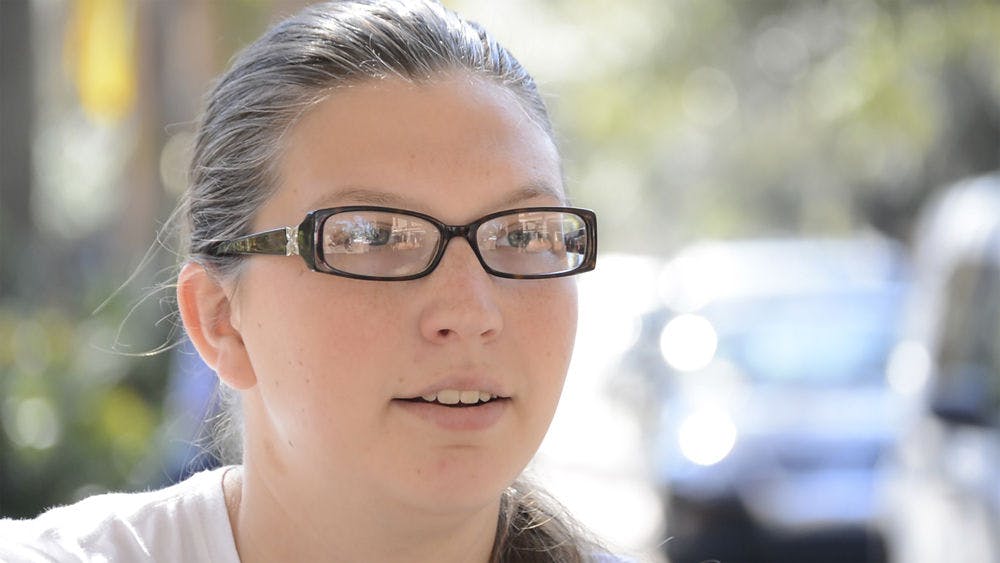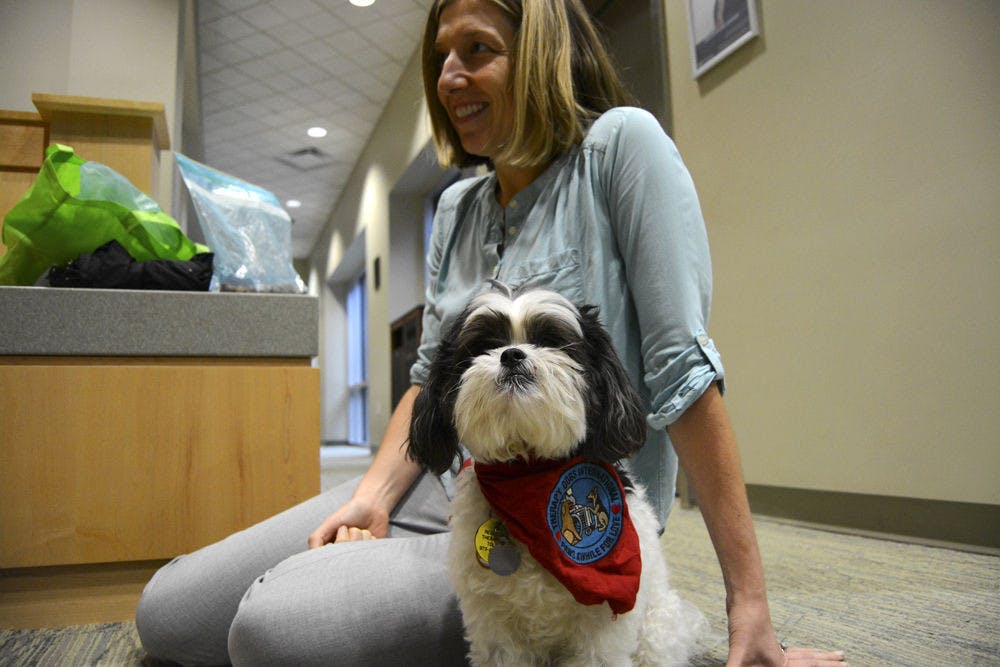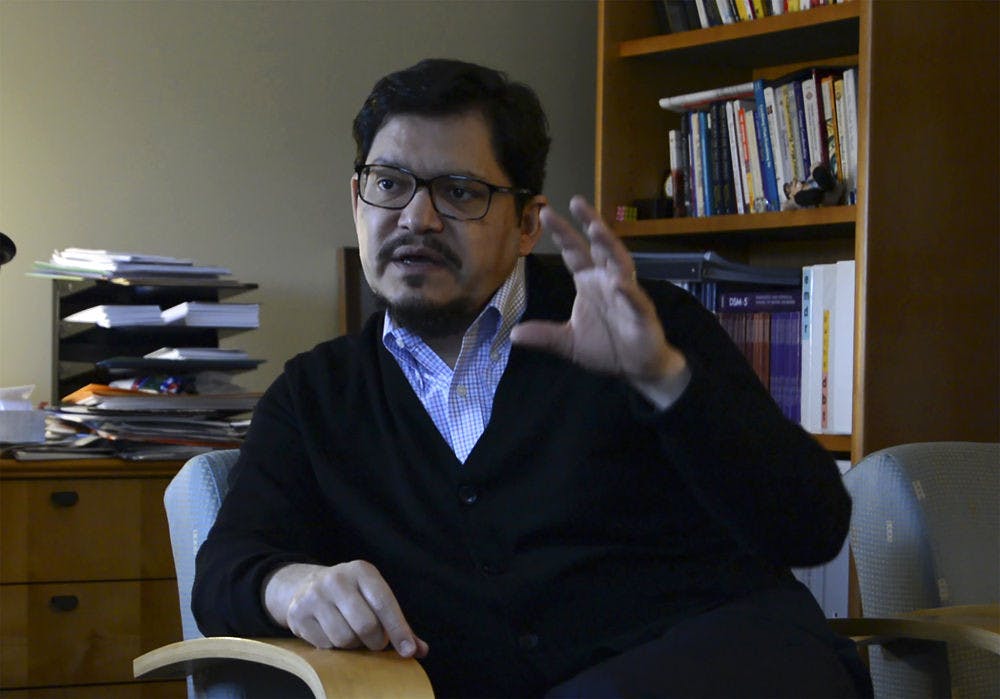Sarah Potter knows when she’s losing control.
Sometimes, it’s just for minutes. Other times, it’s hours.
But the symptoms are always the same: Her throat tightens. Her eyes water. Her hands shake.
And she’s powerless until it’s over.
The physical effects of insecurity and instability the UF food science and human nutrition junior had struggled with since she was 10 received a diagnosis when she was 17: an anxiety disorder.
Medication and therapy kept it under control until the 21-year-old decided she was fine and stopped taking a single Prozac pill each day.
But three months later, a suicide joke coupled with the lingering stress of school triggered another attack.
“I think everything just kind of hit me all at once,” she said.
Without enough time to reach out to her old therapist in Pensacola, the then-sophomore turned to the Counseling and Wellness Center at UF. She began to see a counselor every other week, and they worked together to help her overcome her past and build a future.
But Potter soon became one of several UF students who left the center because long-term care wasn’t feasible with its current funding. With more students requesting mental health services, the CWC is struggling to provide the consistency and stability its clients need for more than a semester.
It’s a limitation Potter feels is upsetting.
“It’s too small to actually help really anybody,” she said.

Sarah Potter, a 21-year-old UF food science and human nutrition junior, is one of many students who has had to leave treatment at the Counseling and Wellness Center because of inconsistent treatment resulting from insufficient funding.
• • •
Financial restrictions are nothing new to the staff at the CWC.
In 2010, the counseling center merged with the former Student Mental Health Center due to budget cuts, according to Alligator archives. The combined centers and GatorWell moved into a new building on the intersection of Radio Road and Bledsoe Drive, near the Southwest Recreation Center.
But each semester, the demand on the 32 clinicians and therapists inside continues to grow — a demand that financially cannot be met. During the first week of school this Fall, the counseling center had 518 appointments. Nine weeks later, in the last week of October, they had 990 appointments.
Ernesto Escoto, the center’s director, said the CWC has done its best to accommodate the needs of students. Staff meetings — instrumental for discussing protocol, concerns and goals — have been cut to ensure the staff is able to provide students with an average of six to seven individual sessions with a therapist.
“Most counseling centers are struggling with this,” he said. “I do believe that we will need to increase resources. It’ll be absolutely necessary, because I suspect that our demand will continue to increase.”
Jennifer Stuart, who has worked as a psychologist for the past seven years at the center, said counselors spend about 60 percent of their time with students. The rest of the time, they balance attending committee meetings, supervising interns and filling out paperwork.
The hardest part, Stuart said, is having students come in during midterms and finals when stress is at its highest. With limited resources, the counselors have to decide how to best serve students without knowing what clients will come in tomorrow.
“There’s no physical way for us to provide all the care for the students who walk through the door using individual therapy only,” she said.
Last Fall, Escoto submitted a budget request increase to the UF Fee Committee. A 20-cent raise in the Student Health Fee, which provides about 85 percent of the counseling center’s budget, would have paid for salary raises and the hiring of two post-doctoral students as counselors, he said.
The committee, made up of four students and three staff members, voted whether to recommend increases for student-paid fees such as the Student Health Fee, Service and Activities Fee and the Athletic Fee, to Vice President for Student Affairs Dave Kratzer.
“(Committee members) were all open to expressing their views in terms of what they felt about their particular request,” said Kim Pace, the assistant vice president for Student Affairs and Fall 2015 committee chair. They voted unanimously to support a 10-cent increase, a recommendation Pace said has yet to be officially approved or disapproved.
But with the remainder of the counseling center’s budget relying on state funding, the potential fee increase may not result in a budget increase. For now, Escoto plans to use the extra 10 cents to pay for salary raises for current staff members, some of whom are graduate students and paid interns.
This Spring, Escoto submitted another funding request of about $750,000 to the UF Board of Governors to renovate the Crisis and Emergency Resource Center on the fourth floor of Peabody Hall and hire more staff.
“We want to expand those services to our students because we know that it’s in high demand,” he said, adding that having more than two counselors in the center on campus would provide another resource for students.
Until the requests are approved, Escoto said, the counseling center remains limited.
“It’s like a bus, right? A bus comes with 100 seats,” he said. “Once you sit 100 people, you cannot put anymore in that bus.”
“You have to wait for somebody to get off the bus and then let somebody else walk into the bus and have a seat.”

Nine-year-old Shitzu Gabe is one of two therapy dogs students can play with at the Counseling and Wellness Center during ‘Yappy Hour,’ on Thursday from 3:30 p.m. to 4:30 p.m. His owner, Jennifer Stuart, is a psychologist at the CWC.
• • •
For now, one semester is all the counseling center can offer students.
But it isn’t in their nature to turn people down, Stuart said. When there are students without health insurance, or without a way to get to an off-campus resource, the counseling center will do its best.
She said the center encourages students to try group therapy, which many students can find helpful. The center also offers Therapist Assisted Online, a seven-week program students can use to connect with a therapist once a week for a 10- to 15-minute consultation. There is also Yappy Hour every Thursday from 3:30 p.m. to 4:30 p.m., during which students can come in and meet therapy dogs Sigmund and Gabe.
“We’re just doing the best we can, with the people sitting in front of us, to make those decision,” she said.
But sometimes, the solution is to go somewhere else.
Last Fall, the counseling center referred about 27 percent of UF students to off-campus resources. These roughly 1,118 cases were ones in which the student suffered from a chronic disorder or their schedule conflicted with appointment times.

Ernesto Escoto, director of the Counseling and Wellness Center, said the CWC was stretched beyond its capacity as student demand for its services swells midway through last Fall semester.
This was the case with Sarah Potter.
Potter had nine individual sessions with a therapist, but once a new semester started, she felt the counseling center couldn’t provide her a stable environment.
After talking to her parents, she found a therapist at UF Health who she sees once a week. So far she’s spent $195 on sessions. Her medications cost her about $150 a year.
“I will see her until I graduate. I need that steadiness, because I don’t know half the stuff that’s going through my mind,” she said.
But while Potter had a positive experience despite the counseling center’s limitations, Chase Minervini was grateful for an alternative.
The 21-year-old UF economics and political science senior struggles with anxiety and depression. After going to an evaluation appointment his freshman year, he waited.
But he never received an answer.
Frustrated and sick, he went back his sophomore year. He was able to see a counselor for eight sessions, but the center could no longer offer him more individual sessions.
He said they offered group therapy as a way for him to relate to his peers. He gave it a try, but it wasn’t the same. He continued to struggle; continued to break down.
“What am I reaching out for when it doesn’t feel like I’m getting any help?” he said.
During his darkest times, he’s considered suicide.
He went back for a third evaluation appointment during Spring 2015, but there were no appointment times that fit his schedule. The counselor extended his appointment and called about a dozen off-campus clinics. He said she called until she found a clinic that would take his insurance.
Last Spring, Minervini became a patient at UF Health Springhill, where he currently sees a therapist and pays a $40 copay every session. He’s spent about $600 on counseling sessions, and he spends about $200 a year on medication.
“I’m coping with just being a normal person,” he said.
• • •
But students at UF are coming together to provide a solution.
Anthony Coscia, 20, started Gators for Mental Health Policy Awareness to help bring attention to mental health on campus. In its second semester, the UF psychology junior said the aim is to help inform students of the consequences of not treating mental health.
“Just because you don’t see it, doesn’t mean it doesn’t exist,” he said. “I just feel like a lot of people in this world suffer due to mental health disorders.”
The group plans to write letters to the state legislators to support funding for state universities with counseling centers.
UF Student Sen. Kylie Werk, chairwoman of the Mental Health Awareness Committee, said raising mental health awareness has been her goal since she joined Student Government.
“We’re more focused on raising awareness of the (UF) resources, but also the topic of mental health,” Werk said.
Having dealt with eating disorders since middle school and anxiety since high school, she said she understands the demand the counseling center faces and the struggles of students who need the care.
“I want to see actual action and improvement on campus,” she said.
And despite Potter’s continued struggle with anxiety, that’s what she’ll try to do — without the help of the counseling center.
“I just keep pushing forward,” she said, “and hope that it gets better.”






